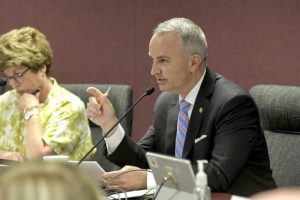Missouri governor’s spending spree, including a proposed $56 million on pre-K, raises questions
Missouri Gov. Mike Parson unveiled a number of ambitious spending initiatives in his State of the State speech, including $56 million to expand prekindergarten options which some are…

Missouri Gov. Mike Parson unveiled a number of ambitious spending initiatives in his State of the State speech, including $56 million to expand prekindergarten options which some are questioning.
“Fifty percent of all our families with pre-K students will be able to enroll their children in expanded programs through their local school district or charter school at no cost,” he said Wednesday.
Many Democrats applauded that decision, including House Minority Leader Crystal Quade, D-Springfield.
“With the amount of money that we’re talking about, I would love to see that expanded to every kid,” Quade said, according to a report by St. Louis Public Radio. “It’s wonderful that we’re prioritizing low-income kids, but every child needs that first fresh start.”
However, some Republicans voiced their concerns with the plan.
“There are a lot of priorities that I’d like to see moved in the realm of education,” said Sen. Bill Eigel, R-Weldon Spring, in the same report. “But I don’t know if expanding government run schools to an earlier age is necessarily the answer to getting better outcomes.”
Hurting students’ academic, social performance?
While research continues into the long-term effect of state-run pre-K programs, some studies have indicated they can harm students’ academic and social performance over time.
For example, Vanderbilt University discovered children in a Tennessee pre-K program ranked behind their peers academically and were more likely to have committed behavioral offenses in follow-up studies.
“The pre-k children scored below the controls on the state achievement tests,” researchers wrote. “Moreover, they had more disciplinary offenses and none of the positive effects on retention and special education that were anticipated.”
Researchers like Dale Farran are still discussing the disparities between the pre-K student and control groups. One reason could involve “transition time,” or simply the time taken up in moving children around the building.
“If you’re in an older elementary school, the bathroom is going to be down the hall. You’ve got to take your children out, line them up and then they wait,” Farran said. “And then, if you have to use the cafeteria, it’s the same thing. You have to walk through the halls, you know: ‘Don’t touch your neighbor, don’t touch the wall, put a bubble in your mouth because you have to be quiet.'”
By implementing such stringent regulations on 4-year-olds, Farran said, pre-K programs could inadvertently contribute to the behaviors that resulted in extra disciplinary measures.
“I think children are not learning internal control,” she said. “And if anything, they’re learning sort of an almost allergic reaction to the amount of external control that they’re having, that they’re having to experience in school.”
In Missouri, Eigel laments that the infusion of funding into pre-K programs only magnifies the state’s control over public education.
“Of all the things that we’ve done over the past six years while I’ve been in the Senate,” he said, “expanding the budget, and expanding government, unfortunately, has been one of the most aggressive things we’ve done.”



